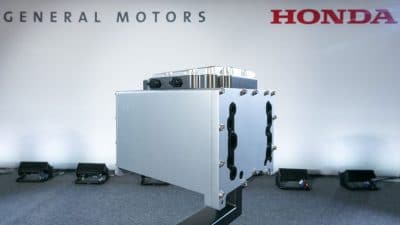Japan remains fully committed to integrating hydrogen into its national energy mix, and is looking to Europe and to a lesser extent the U.S. for markets and research support. Developers f residential fuel cell systems have all found European partners to bid for FCH-JU funding. And Japan’s Toyota has quietly led an international effort to engage corporations at the highest level in planning for a hydrogen transition. The result, The Hydrogen Council, announced at Davos in January, could be the most significant step towards hydrogen this year, if it can get organized to take advantage of the CEOs and Chairmen who were involved in the launch.
Companies include AngloAmerican, Air Liquide, Alstom, BMW GROUP, Daimler, ENGIE, Honda, Hyundai Motor, Kawasaki, Royal Dutch Shell, The Linde Group, Total and Toyota. The Council is led by two Co-Chairs, currently Air Liquide and Toyota. There are no US companies on the list yet, though recruiting is under way.
In Japan itself, implementation of the new hydrogen energy plan is well under way.
- Japan has issued a revised and more detailed hydrogen plan which includes some changes in numerical targets.
- The new target numbers for fuel cell passenger cars are 40,000 by 2020, 200,000 by 2025 and 800,000 by 2030. There is a target of 100 buses, in time for the Tokyo Olympics in 2020, which Japan intends to utilize to showcase its progress on hydrogen. The plan also calls for commercialization of fuel cell trucks and forklifts, though no numerical targets have been established. In all cases, the government recognizes the need for marketplace subsidies.
- …
- NEDO (New Energy and Industrial Technology Development Organization) is implementing R&D contemplated by the plan.
- It has announced three R&D projects examining the use of hydrogen in combustion turbines, which is seen as a potentially significant source of demand for hydrogen ost-2030. It has launched six renewable hydrogen/ grid stability projects.
- …
- …
Vehicles
Honda began offering its latest Fuel Cell Clarity vehicle about a year ago in small numbers, but appears to be aiming at 2020 for a more robust commercialization push, with a target of sales at an “affordable price” shortly thereafter. To this end Honda is partnering with General Motors on research and development. The two companies announced in January the formation of a joint manufacturing venture, Fuel Cell System Manufacturing, LLC, which will produce fuel cell systems in an existing GM facility about 20 miles southwest of downtown Detroit.
The companies will invest $85 million, creating about 100 jobs. This is a modest investment by auto industry standards; it remain to be seen just how much volume the facility can produce.
Toyota, on the other hand, is manufacturing in Tokyo, at its Motomachi plant where it has committed to expanding the use of hydrogen. Toyota recently began operating two fuel cell forklifts there, and is developing technologies and strategies to use hydrogen in operating the plant and manufacturing vehicles, with an implementation target date of 2020. Expect the next generation of vehicle in 2020 as well, in time for the 2020 Tokyo Olympics.
…
Author: Robert “Bob” Rose


























0 Comments